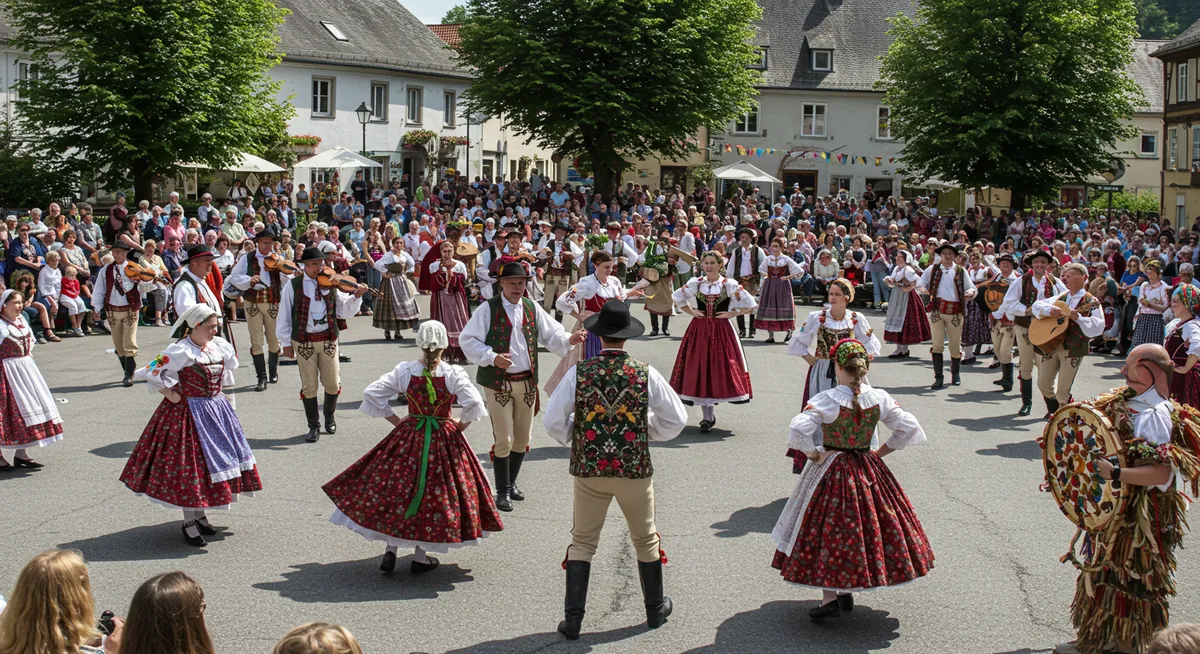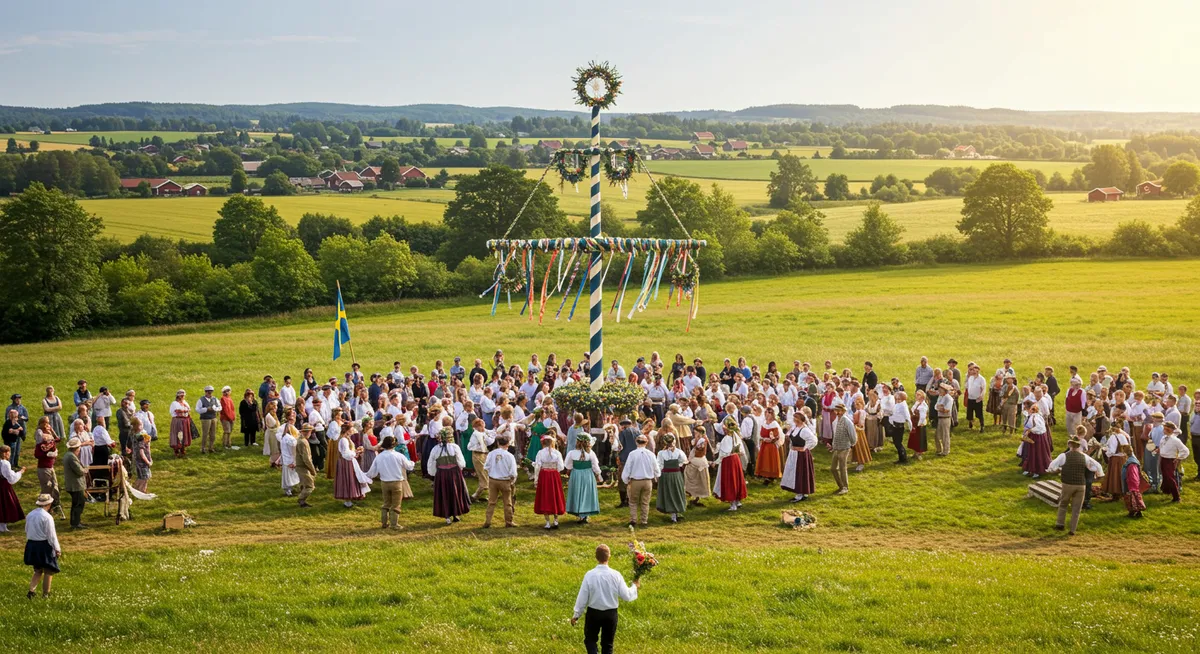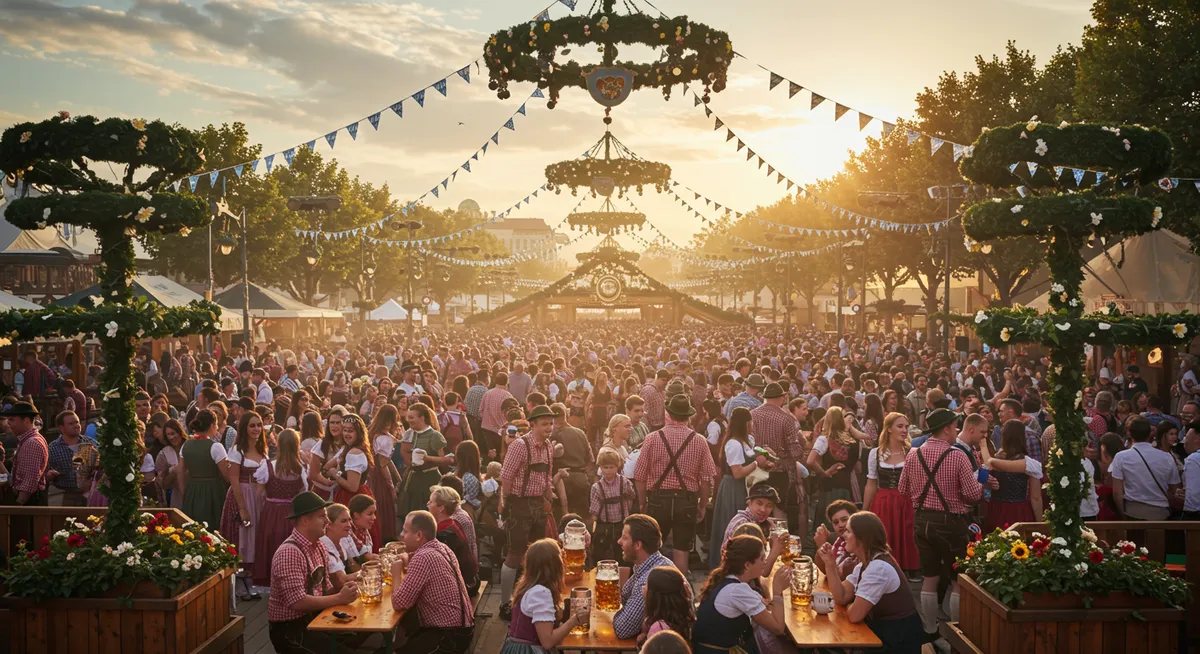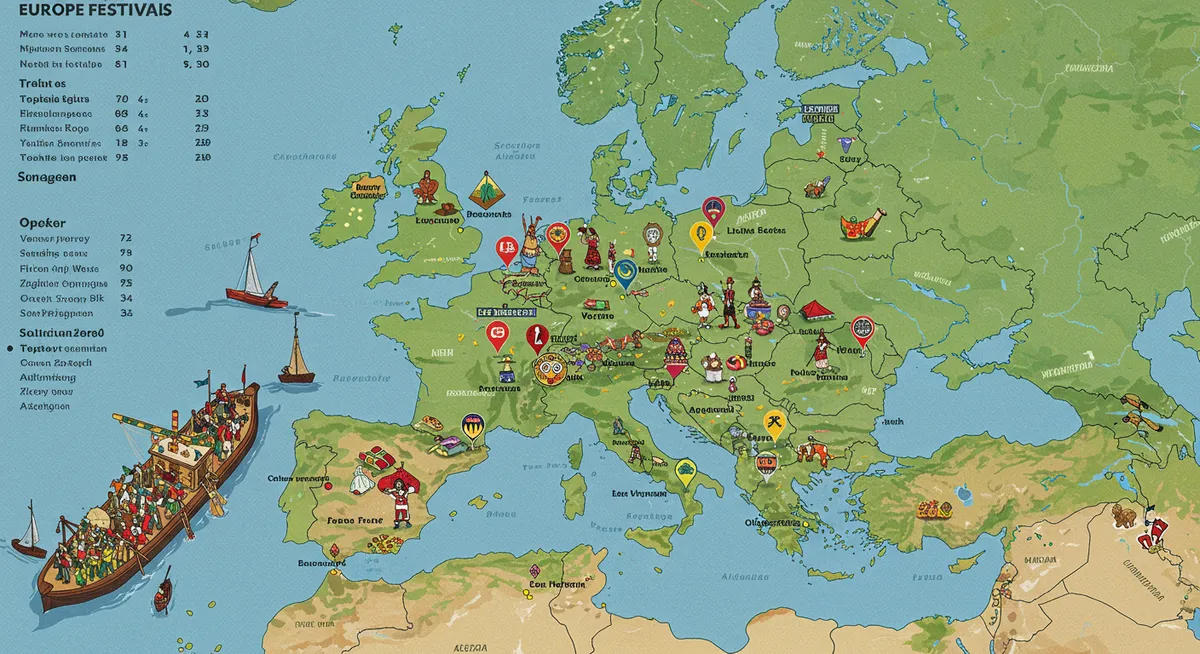European Cultural Festivals Guide | Traditional & Modern Celebrations

European Cultural Festivals: From Ancient Traditions to Modern Celebrations
Europe's festival landscape is as diverse as its cultural heritage, offering travelers an extraordinary window into the continent's living traditions. From the midnight sun celebrations in Scandinavia to grape harvest festivals along the Mediterranean coast, European cultural festivals reflect thousands of years of history, religious influences, seasonal rhythms, and modern cultural innovations. This guide explores the most significant and captivating festivals across European regions, providing essential information for travelers seeking authentic cultural immersion experiences.

The Rich Cultural Tapestry of European Festivals
Europe's festival heritage draws from multiple influential traditions that have shaped the continent's cultural identity:
- Pre-Christian Celebrations: Many European festivals have roots in ancient pagan rituals marking seasonal changes and agricultural cycles
- Religious Traditions: Christian, Jewish, and Islamic influences have created rich traditional celebrations throughout Europe
- Regional Folk Customs: Distinctive local cultures have maintained unique festival traditions reflecting their particular history and environment
- Modern Cultural Expressions: Contemporary European festivals celebrate modern artistic innovation while often incorporating traditional elements
Major European Festival Categories
European festivals can be broadly categorized to help travelers find experiences that match their interests:
Seasonal and Agricultural Celebrations
Europe's ancient connection to agricultural cycles and seasonal changes lives on in festivals that mark important moments in the natural year:
- Midsummer Celebrations: Across Scandinavia and the Baltic countries, summer solstice celebrations feature bonfires, dancing, and floral decorations
- Harvest Festivals: From German wine festivals to olive harvests in Mediterranean countries, agricultural abundance is celebrated with food, drink, and music
- Spring Renewal Rituals: From Switzerland's Sechseläuten to May Day celebrations across the continent, winter's end is marked with festive traditions

Religious and Spiritual Festivals
Europe's religious heritage has created some of its most spectacular and moving festival traditions:
- Easter Celebrations: From Spain's Semana Santa processions to Eastern Orthodox Easter ceremonies, spring religious festivals are among Europe's most dramatic
- Patron Saint Days: Local saints are honored with processions, feasts, and festivities across Catholic and Orthodox regions
- Christmas Markets and Traditions: From German Christkindlmarkts to Scandinavian St. Lucia celebrations, winter festivals combine religious significance with cultural warmth
Historical Commemorations and Folk Traditions
Europe's rich history provides the foundation for festivals that bring the past vividly to life:
- Medieval Fairs: Towns across Europe recreate their medieval heritage with period costumes, crafts, food, and entertainment
- Historical Reenactments: From Viking festivals in Scandinavia to Roman celebrations in Italy, historical events are commemorated through immersive experiences
- Folk Dance and Music Festivals: Traditional performing arts are preserved and celebrated through dedicated festivals featuring regional costumes, instruments, and dances
Modern Cultural Celebrations
Contemporary Europe has developed new festival traditions that celebrate modern cultural expressions:
- Film Festivals: From Cannes to Berlin, European cinema is celebrated through prestigious international film events
- Music Festivals: From classical music in Salzburg to electronic music in Barcelona, Europe hosts world-class music celebrations
- Arts and Design Festivals: Contemporary creative expressions are showcased in events like the Venice Biennale and London Design Festival
European Festival Regions
European festivals reflect distinct regional characters shaped by geography, history, and cultural influences. Exploring these regions reveals the continent's remarkable diversity:
Northern Europe
Scandinavia and the Baltic countries celebrate their connection to nature's cycles with particular emphasis on light and darkness:
- Sweden's Midsommar: Flower garlands, maypole dancing, and all-night celebrations mark the summer solstice
- Finland's Vappu: May Day celebrations combine student traditions with spring festivities
- Norway's Constitution Day: National pride is expressed through children's parades, traditional costumes, and community gatherings
- Estonia's Song Festival: Massive choral gatherings celebrate cultural identity through traditional music
Western Europe
The British Isles, France, Belgium, and the Netherlands blend ancient traditions with cosmopolitan cultural celebrations:
- Edinburgh Festival Fringe: The world's largest arts festival transforms Scotland's capital each August
- Nice Carnival: France's Mediterranean coast comes alive with elaborate floats and costumed parades
- Belgium's Carnival of Binche: UNESCO-recognized celebration features distinctive "Gilles" characters in wax masks
- Netherlands' King's Day: Orange-clad revelers celebrate the Dutch monarchy with nationwide festivities
Central Europe
Germanic and Alpine countries offer rich folk traditions and seasonal celebrations:
- Munich's Oktoberfest: The world's largest beer festival celebrates Bavarian culture with traditional food, music, and costume
- Switzerland's Fasnacht: Basel's three-day carnival features lantern parades and traditional "Gugge" music
- Austria's Krampuslauf: Alpine winter traditions feature frightening masked figures accompanying St. Nicholas
- Czech Republic's Burning of the Witches: Spring purification rituals feature bonfires and effigy burning

Eastern Europe
Slavic countries and their neighbors preserve distinctive folk traditions with particularly colorful spring rituals:
- Poland's Juwenalia: Student festival tradition dating back to the Middle Ages
- Bulgaria's Kukeri: Elaborate monster costumes and bells ward off evil spirits in winter ritual
- Hungary's Busójárás: Mohács festival features wooden masks and ritual noise-making to chase away winter
- Romania's Mărțișor: Spring celebration marked by the exchange of red and white amulets
Southern Europe
Mediterranean countries offer dramatic religious processions and exuberant community celebrations:
- Venice Carnival: Italy's famous masked celebration transforms the canal city
- Spain's La Tomatina: Buñol hosts the world's largest tomato fight
- Portugal's Festa de São João: Porto celebrates midsummer with hammers, balloons, and sardines
- Greece's Apokries: Pre-Lenten carnival features masquerades and ancient theatrical elements
Planning Your European Festival Journey
Creating a memorable European festival experience requires thoughtful planning:
Seasonal Considerations
European festivals follow distinct seasonal patterns that can guide your travel planning:
- Winter (December-February): Christmas markets, winter carnivals, and fire festivals brighten the dark months
- Spring (March-May): Easter celebrations, May Day events, and flower festivals mark the return of warmth
- Summer (June-August): Midsummer celebrations, music festivals, and outdoor cultural events take advantage of long days
- Autumn (September-November): Harvest festivals, wine celebrations, and All Saints' Day traditions honor the year's bounty
Festival Routes and Regional Clusters
Maximize your cultural experiences by planning itineraries around festival clusters:
- Mediterranean Summer Circuit: Combine Spain's La Tomatina with local saint's days and French summer festivals
- Winter Alpine Journey: Experience Christmas markets, mountain festivals, and carnival celebrations across the Alps
- Summer Baltic Tour: Witness midsummer celebrations across Scandinavia and the Baltic states
- Spring Mediterranean Pilgrimage: Follow Easter processions and spring festivals across Southern Europe
Practical Travel Considerations
Successful festival travel in Europe requires attention to practical details:
- Accommodation: Book well in advance for major festivals, especially in smaller towns with limited options
- Transportation: Research special festival transportation options and potential road closures
- Crowd Management: Prepare for large crowds at major events with appropriate clothing, water, and meeting points
- Weather Preparation: Many European festivals continue regardless of weather conditions, so pack accordingly
- Ticketing: Research which festivals require advance tickets or reservations for specific events

Responsible Festival Tourism in Europe
Experiencing European festivals respectfully enhances both your experience and the sustainability of these traditions:
- Local Etiquette: Research appropriate behavior and dress for religious or traditional celebrations
- Language Preparation: Learn basic festival-related phrases in the local language
- Sustainable Choices: Use public transportation to festival sites when possible and follow waste management guidelines
- Community Support: Purchase food, crafts, and services from local vendors rather than international chains
- Respectful Documentation: Follow photography guidelines, especially during religious ceremonies or when photographing performers
European Festival Highlights Calendar
While many European festivals shift dates based on religious or lunar calendars, this general timeline can help you plan your festival experiences:
- January: Up Helly Aa (Scotland), Saint Vincent Festival (Portugal)
- February: Venice Carnival (Italy), Nice Carnival (France), Sami National Day celebrations (Scandinavia)
- March: Las Fallas (Spain), St. Patrick's Festival (Ireland)
- April: Easter celebrations across Europe, King's Day (Netherlands)
- May: May Day celebrations, Córdoba Patios Festival (Spain), Cooper's Hill Cheese Rolling (England)
- June: Midsummer celebrations across Northern Europe, San Juan bonfires (Spain)
- July: Running of the Bulls in Pamplona (Spain), Galway International Arts Festival (Ireland)
- August: Edinburgh Festival Fringe (Scotland), La Tomatina (Spain), Notting Hill Carnival (England)
- September: Oktoberfest (Germany), wine harvest festivals across Europe
- October: Alba White Truffle Festival (Italy), Samhain/Halloween celebrations
- November: All Saints' Day traditions, Bonfire Night (UK), St. Martin's Day celebrations
- December: Christmas markets across Europe, St. Lucia Day (Sweden), Krampus parades (Alpine regions)
Immerse Yourself in Europe's Festival Heritage
European festivals offer travelers the rare opportunity to experience living traditions that have shaped the continent's cultural identity for centuries. Whether you're drawn to the dramatic religious processions of Southern Europe, the joyous midsummer celebrations of Scandinavia, the colorful folk festivals of Eastern Europe, or the historic pageantry of Western European traditions, there's a perfect festival experience waiting for you.
By planning thoughtfully, participating respectfully, and opening yourself to authentic cultural encounters, you'll discover that European festivals provide some of the most meaningful and memorable travel experiences the continent has to offer.
Ready to experience European festivals?
Explore our detailed guides to specific European celebrations and start planning your cultural festival journey.
Check back soon for our upcoming spotlights on iconic European festivals including Spain's La Tomatina, Germany's Oktoberfest, and Scandinavia's Midsummer celebrations.
Explore Cultural Festivals in Other Regions
European festivals blend ancient traditions with contemporary celebrations. Expand your cultural exploration with our guides to other regions around the world:
Global Festival Guide
Return to our main guide to discover cultural festivals worldwide.
Asian Festivals
Compare Eastern traditions with European celebrations.
African Festivals
Discover Mediterranean connections and cultural exchanges.
Latin American Festivals
Explore festivals with Spanish and Portuguese influences.
North American Festivals
See how European traditions evolved in the New World.
Middle Eastern Festivals
Explore the crossroads between European and Middle Eastern cultures.
Oceania Festivals
Discover how European traditions blend with Pacific island cultures.
If you're drawn to European festivals, we especially recommend exploring Latin American festivals with their strong Iberian influences, or North American celebrations that preserve and transform European cultural heritage.